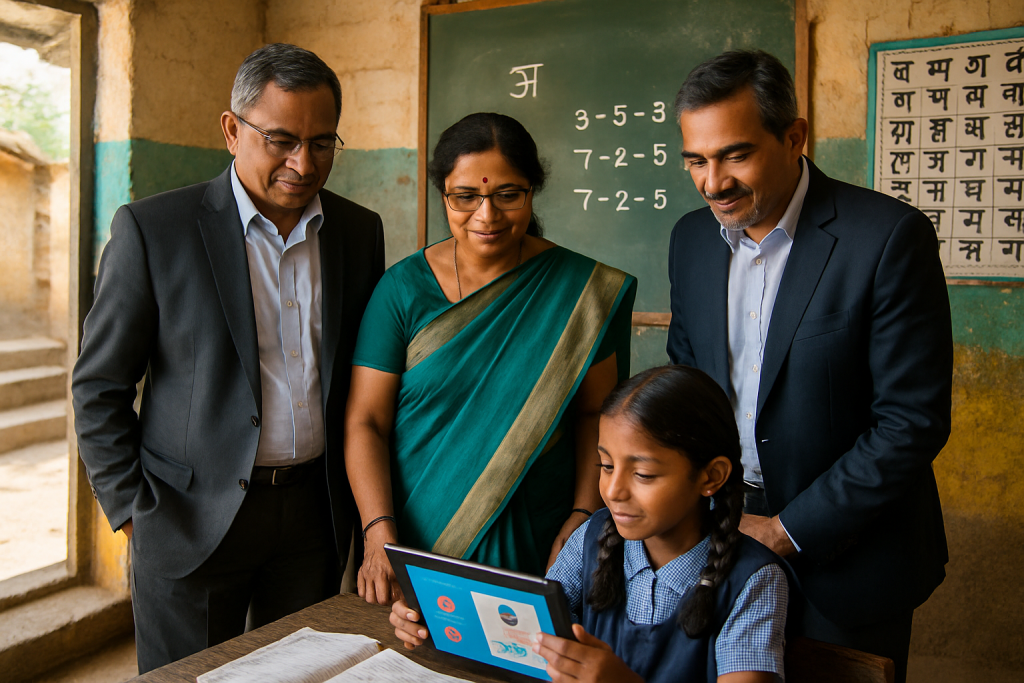A small village near Nagpur has launched India’s first AI-enabled anganwadi. The project could transform early childhood education across rural areas. Business leaders in education technology see significant opportunities ahead.
The anganwadi in Waddhamna village serves children aged two to six. According to The Indian Express, attendance doubled from 10 to 25 students. The facility uses virtual reality headsets, interactive smart boards, and tablets.
Maharashtra Chief Minister Devendra Fadnavis inaugurated the project on July 27. The Nagpur Zilla Parishad spent Rs 9.5 lakh from its CESS fund. The initiative falls under Mission Bal Bharari, which aims to bridge rural-urban digital gaps.
Vinayak Mahamuni, CEO of Nagpur Zilla Parishad, explained the selection process. “We chose this particular anganwadi because of its accessibility, the sevika’s enthusiasm and its proximity to other centres for training visits,” he told The Indian Express.
The project partnered with Qolaba, a tech firm under India’s IndiaAI programme. Workers received three months of structured training to handle the technology. The system adapts learning based on each child’s response time and accuracy.
Why It Matters Now
This pilot project addresses a critical gap in rural education infrastructure. Traditional anganwadis struggled with low attendance and limited resources. The AI-enabled model shows promising early results in student engagement.
Parents report dramatic changes in their children’s behavior. Village resident Rajini Rahile’s son “doesn’t cry anymore at the mere mention of the word anganwadi,” according to The Indian Express. Another parent, Preeti Balbudhe, noted her daughter “recites poems I haven’t even heard of.”
Saroj Kukde, the anganwadi worker, uses the technology for one hour daily. She operates 10 VR sets and interactive smart boards during five-hour sessions. “Earlier, I taught with whatever tools I had. Now, I too learn new things every day,” Kukde told reporters.
Market Impact in India
The success could create substantial opportunities for education technology companies. India has over 1.3 million anganwadis serving 100 million children. Scaling this model would require massive investment in hardware and training.
Kailash Ghodke, Deputy CEO of Women and Child Development, highlighted the learning advantages. “Tech-enabled learning takes it a step further. After a virtual garden tour, children answer questions on what they saw,” he explained to The Indian Express.
Mayank Mukul, vice president of Qolaba, detailed the AI functionality. “The smart board and VR headsets use gamified learning to track a child’s response time and accuracy. Based on their response time, the system uses AI models to adjust the difficulty levels.”
Strategic Advantage
The project goes beyond basic education. Plans include tracking nutrition and growth using AI tools. The system will integrate with the government’s Poshan Tracker platform for real-time monitoring.
“Anganwadi workers will upload pictures of meals to get real-time feedback on whether they meet a child’s age-specific needs,” Mahamuni told The Indian Express. This holistic approach could set new standards for rural childcare.
The Zilla Parishad plans to expand to 40 more anganwadis across Nagpur district. Weekend training sessions have started for workers from other centers. The model focuses on in-person training rather than written manuals.
What Business Leaders Should Know
This initiative demonstrates how government partnerships can scale education technology. The structured training approach shows how to manage digital transformation in rural areas. Companies should note the importance of adapting technology to local contexts.
The project’s transparency measures include Wi-Fi-enabled CCTV cameras. Key stakeholders can access live feeds for monitoring. This addresses common concerns about equipment security in remote locations.
Mahamuni emphasized the broader vision. “If we can show how AI can transform rural education and health, it can be replicated across India. This is not just a tech project but a social movement,” he told The Indian Express.
Visitors from other blocks are already studying the pilot model. The success could influence national policy on early childhood education. Education technology companies should prepare for potential government partnerships at scale.


